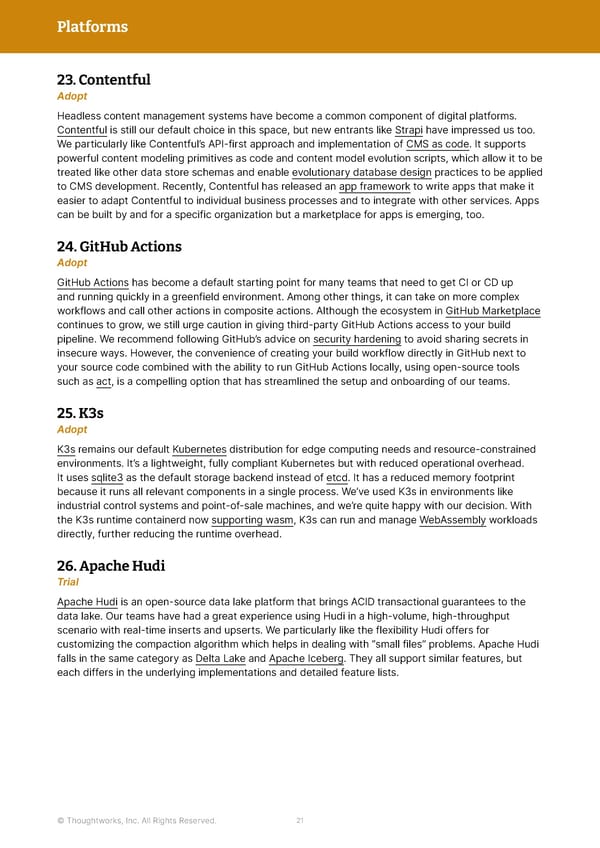Platforms 23. Contentful Adopt Headless content management systems have become a common component of digital platforms. Contentful is still our default choice in this space, but new entrants like Strapi have impressed us too. We particularly like Contentful’s API-first approach and implementation of CMS as code. It supports powerful content modeling primitives as code and content model evolution scripts, which allow it to be treated like other data store schemas and enable evolutionary database design practices to be applied to CMS development. Recently, Contentful has released an app framework to write apps that make it easier to adapt Contentful to individual business processes and to integrate with other services. Apps can be built by and for a specific organization but a marketplace for apps is emerging, too. 24. GitHub Actions Adopt GitHub Actions has become a default starting point for many teams that need to get CI or CD up and running quickly in a greenfield environment. Among other things, it can take on more complex workflows and call other actions in composite actions. Although the ecosystem in GitHub Marketplace continues to grow, we still urge caution in giving third-party GitHub Actions access to your build pipeline. We recommend following GitHub’s advice on security hardening to avoid sharing secrets in insecure ways. However, the convenience of creating your build workflow directly in GitHub next to your source code combined with the ability to run GitHub Actions locally, using open-source tools such as act, is a compelling option that has streamlined the setup and onboarding of our teams. 25. K3s Adopt K3s remains our default Kubernetes distribution for edge computing needs and resource-constrained environments. It’s a lightweight, fully compliant Kubernetes but with reduced operational overhead. It uses sqlite3 as the default storage backend instead of etcd. It has a reduced memory footprint because it runs all relevant components in a single process. We’ve used K3s in environments like industrial control systems and point-of-sale machines, and we’re quite happy with our decision. With the K3s runtime containerd now supporting wasm, K3s can run and manage WebAssembly workloads directly, further reducing the runtime overhead. 26. Apache Hudi Trial Apache Hudi is an open-source data lake platform that brings ACID transactional guarantees to the data lake. Our teams have had a great experience using Hudi in a high-volume, high-throughput scenario with real-time inserts and upserts. We particularly like the flexibility Hudi offers for customizing the compaction algorithm which helps in dealing with “small files” problems. Apache Hudi falls in the same category as Delta Lake and Apache Iceberg. They all support similar features, but each differs in the underlying implementations and detailed feature lists. © Thoughtworks, Inc. All Rights Reserved. 21
 Immersive Experience — Vol 28 | Thoughtworks Technology Radar Page 20 Page 22
Immersive Experience — Vol 28 | Thoughtworks Technology Radar Page 20 Page 22